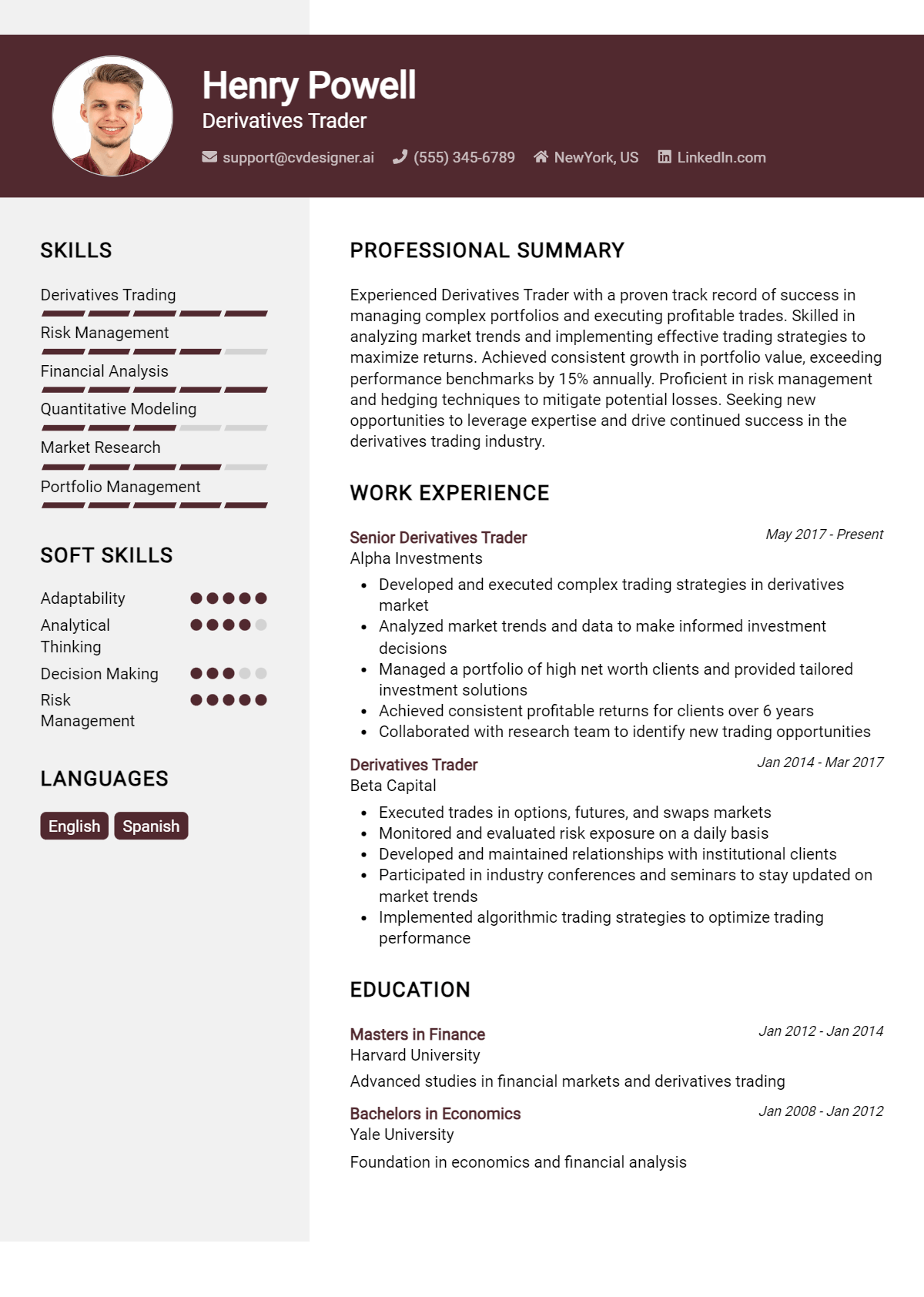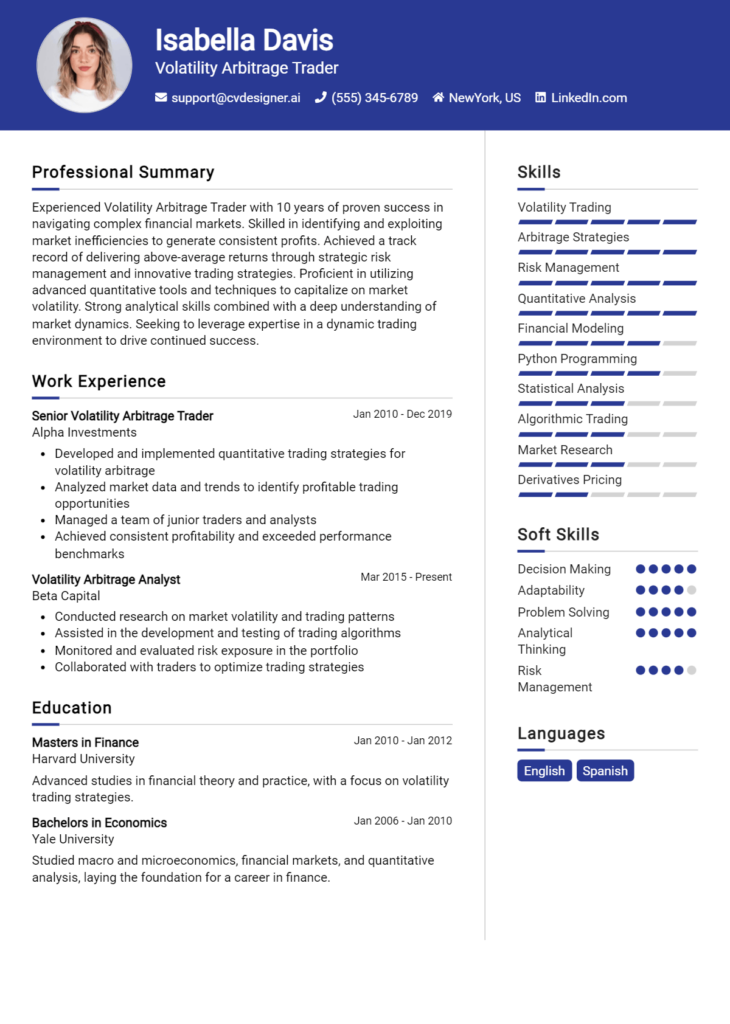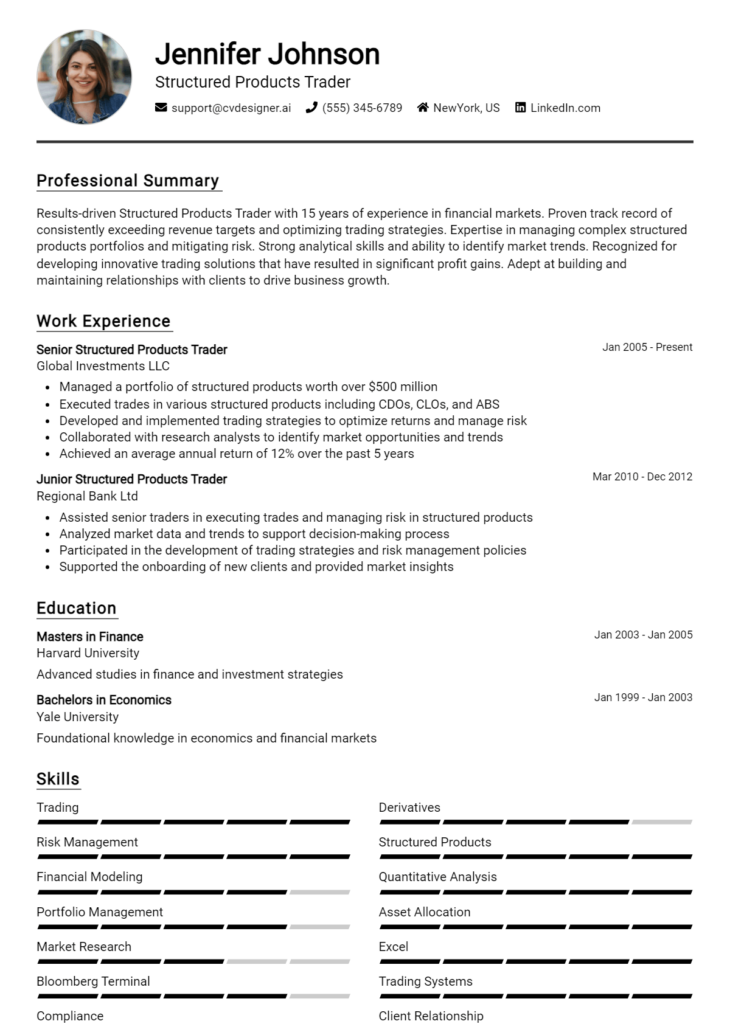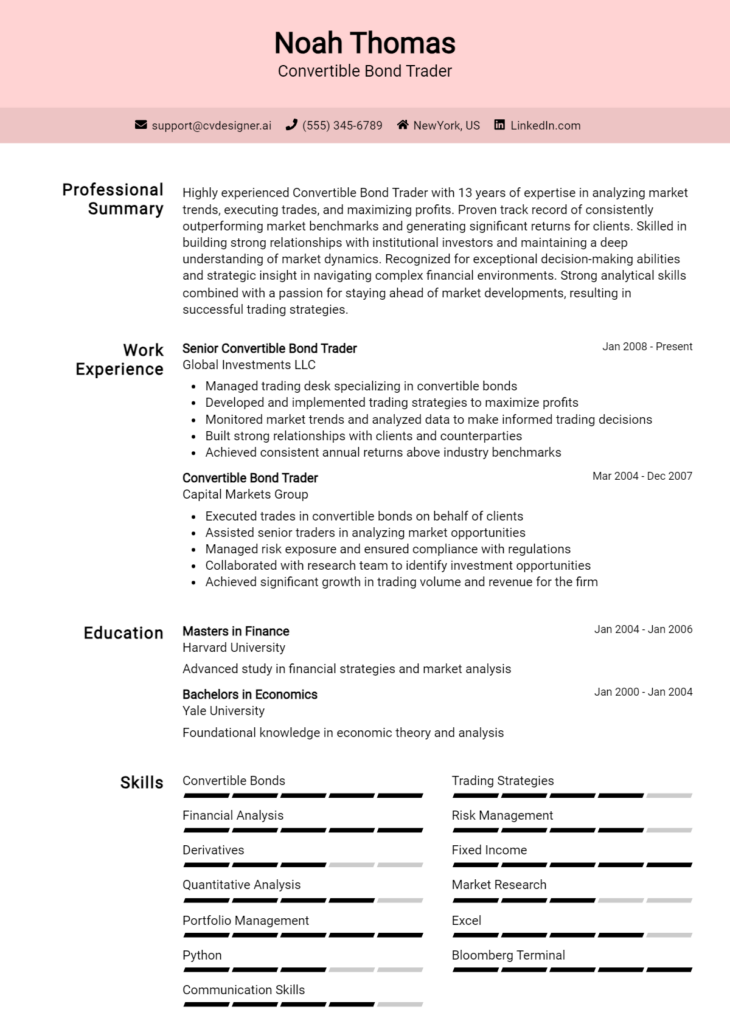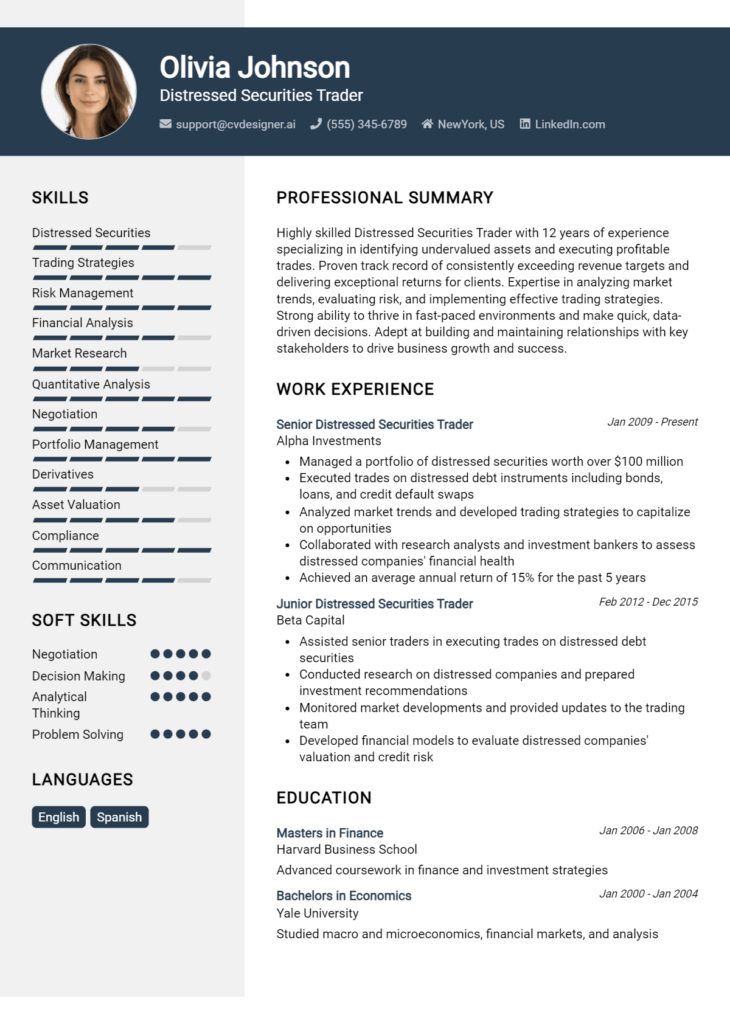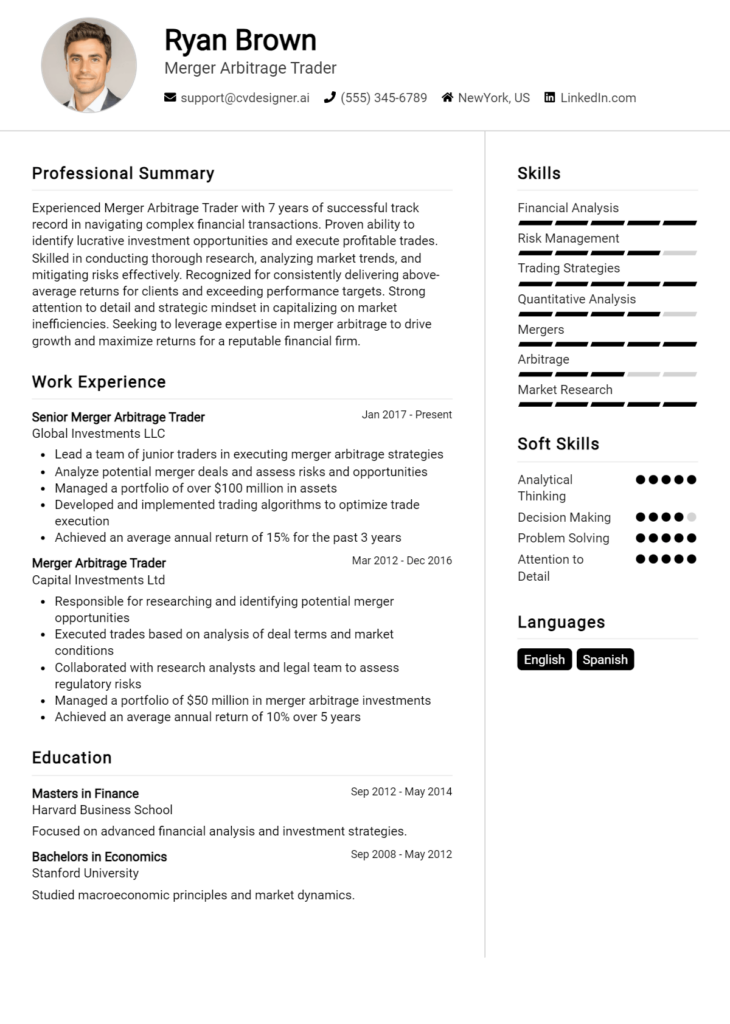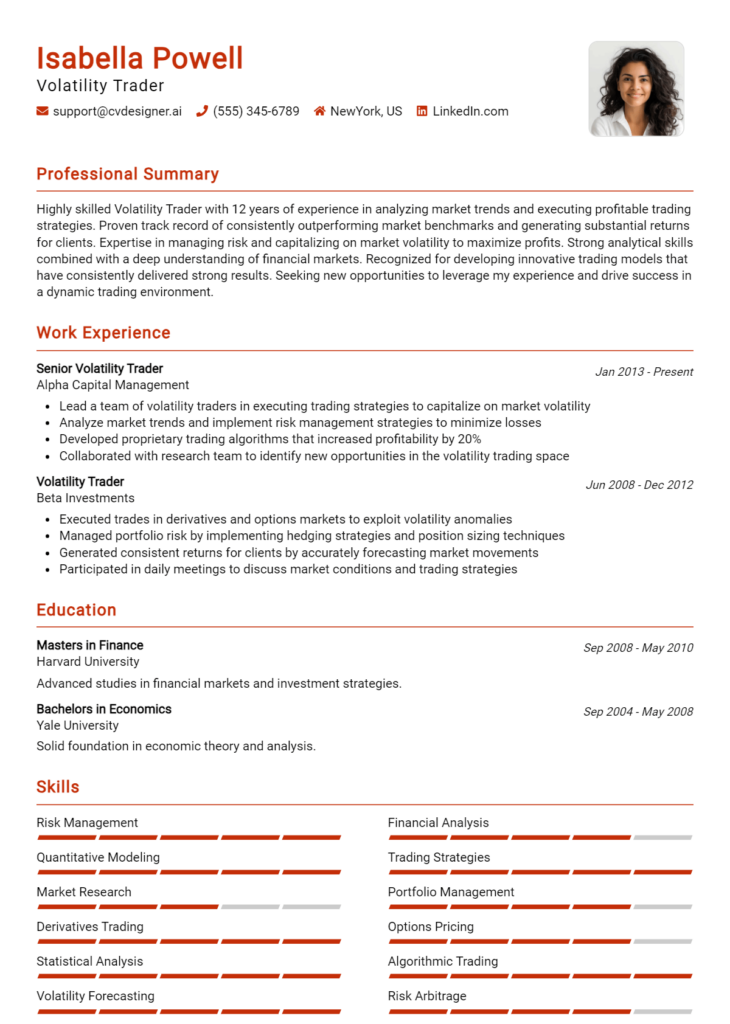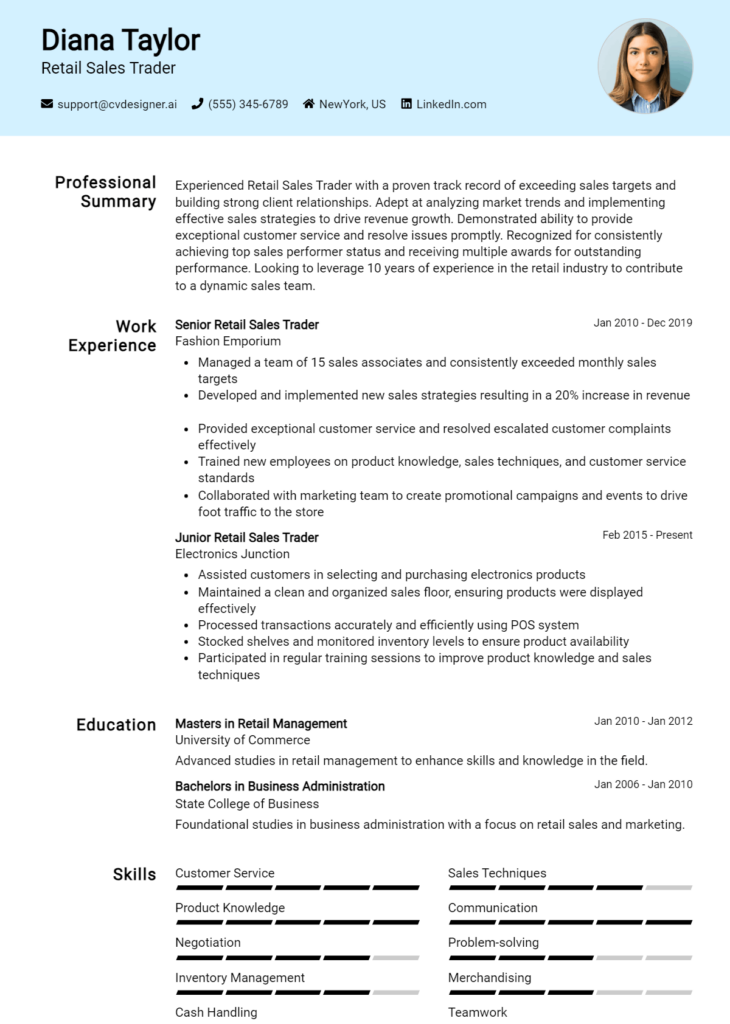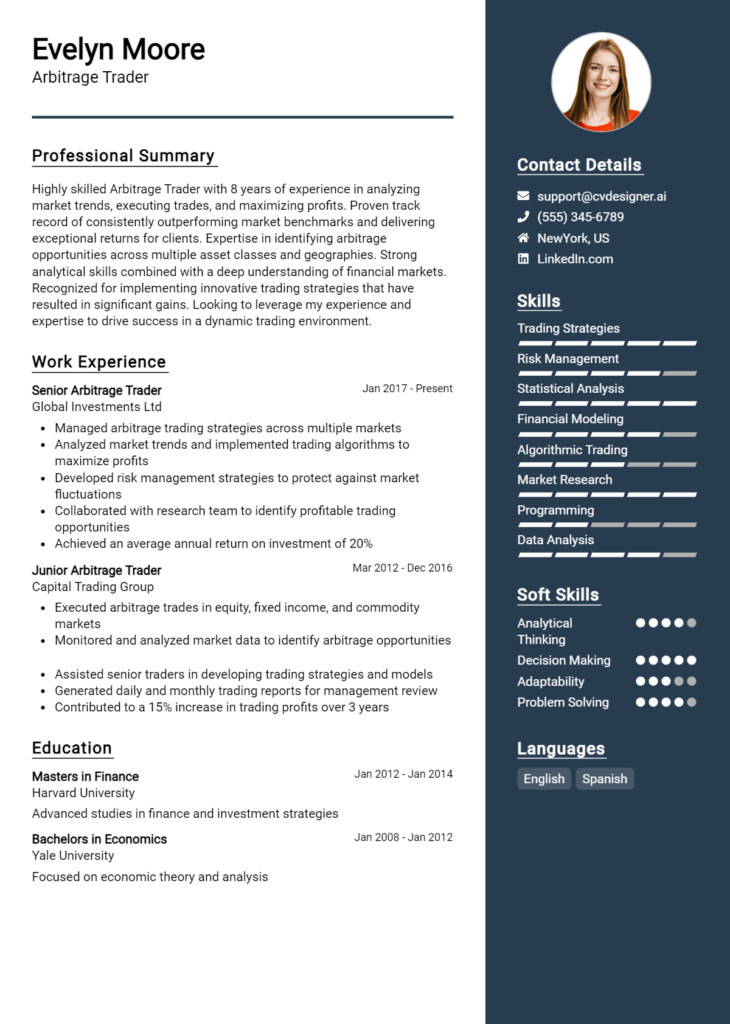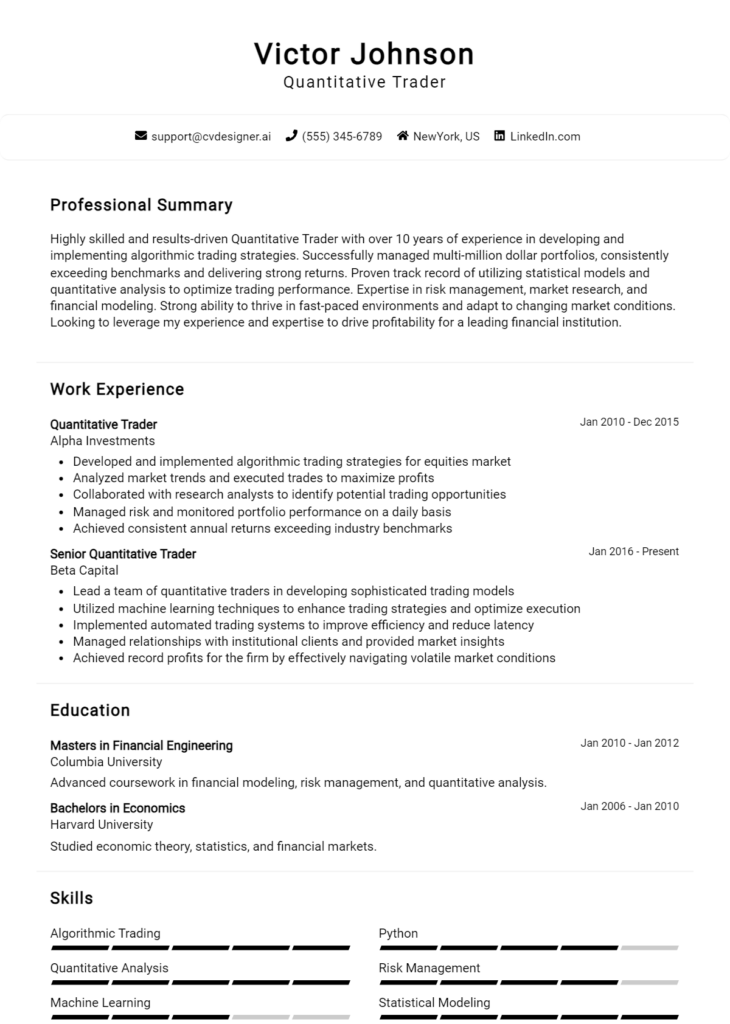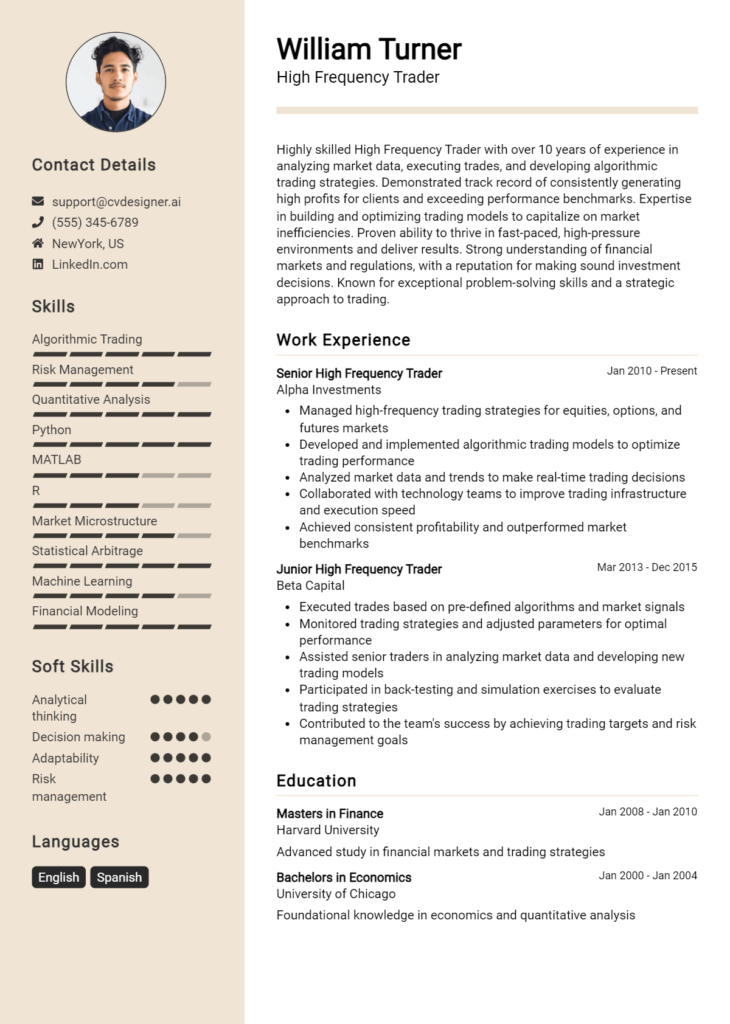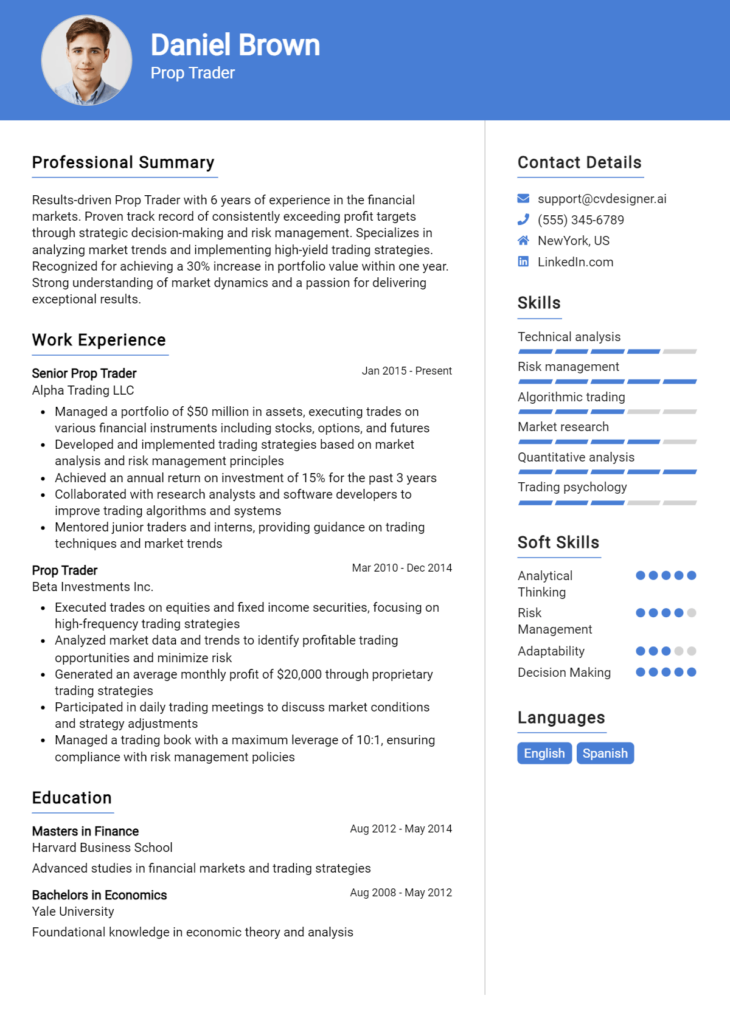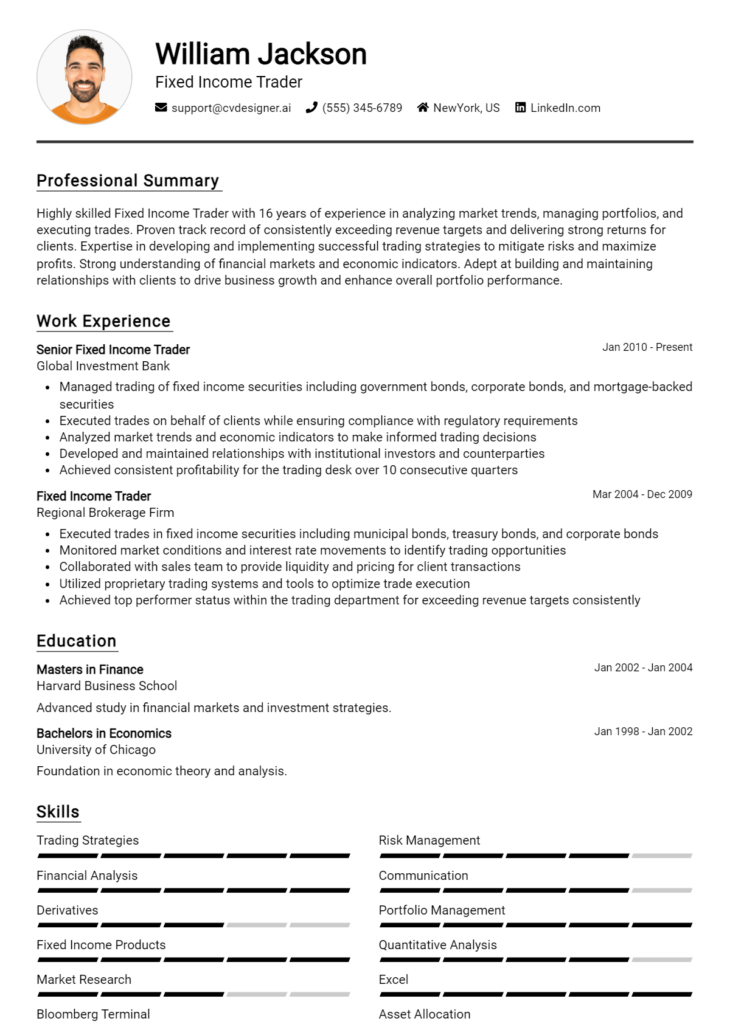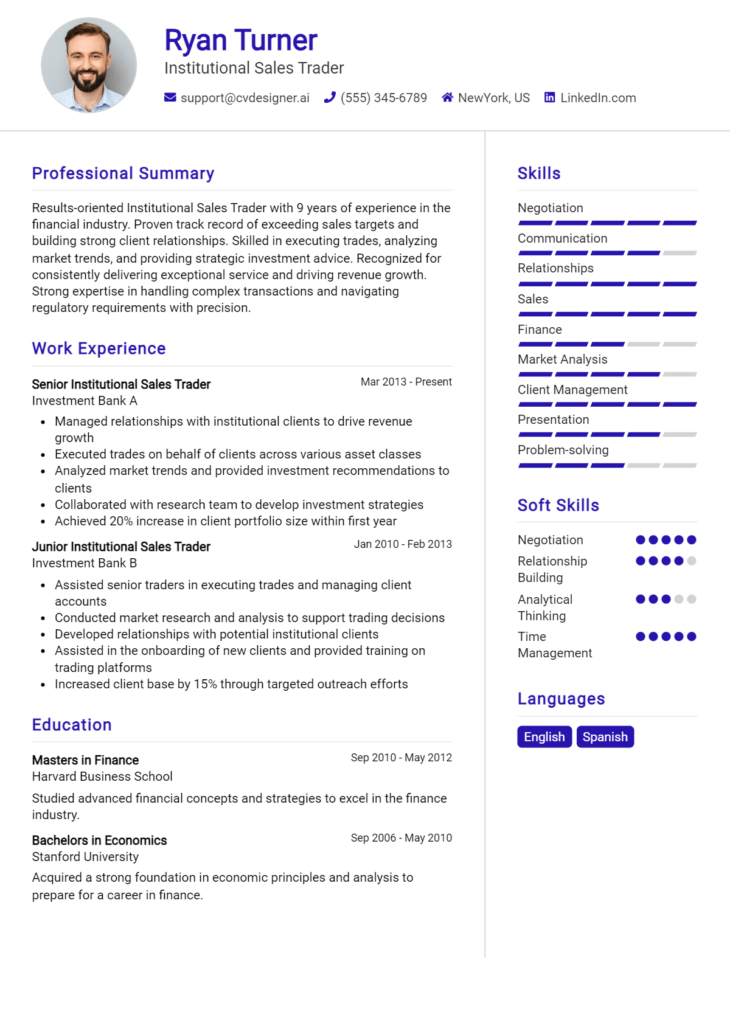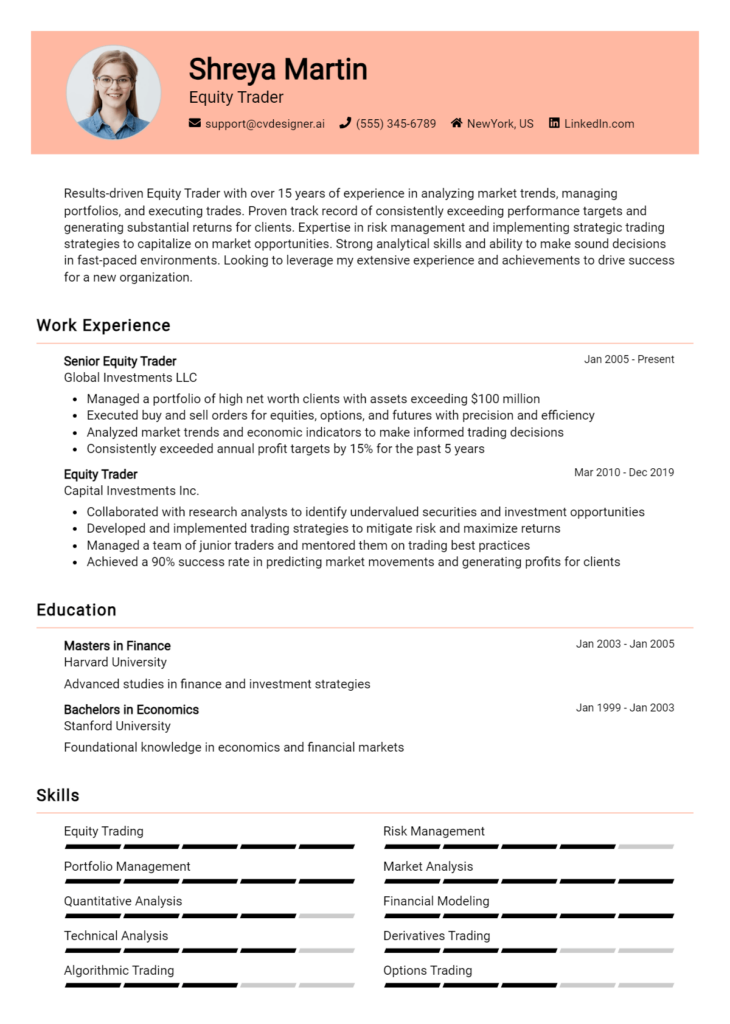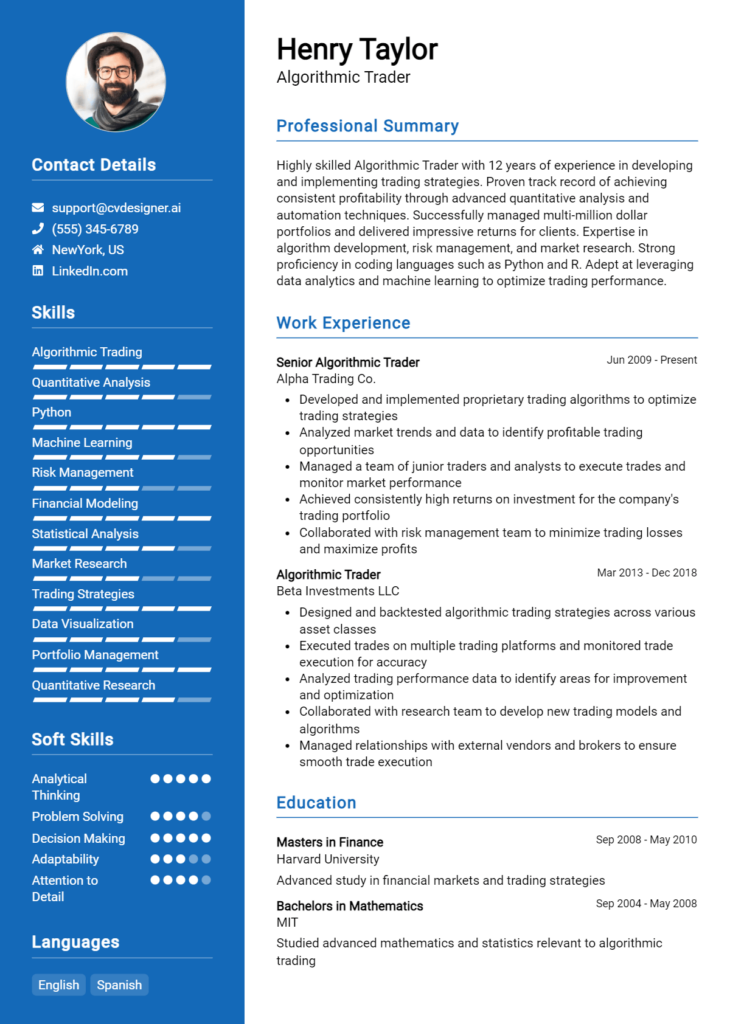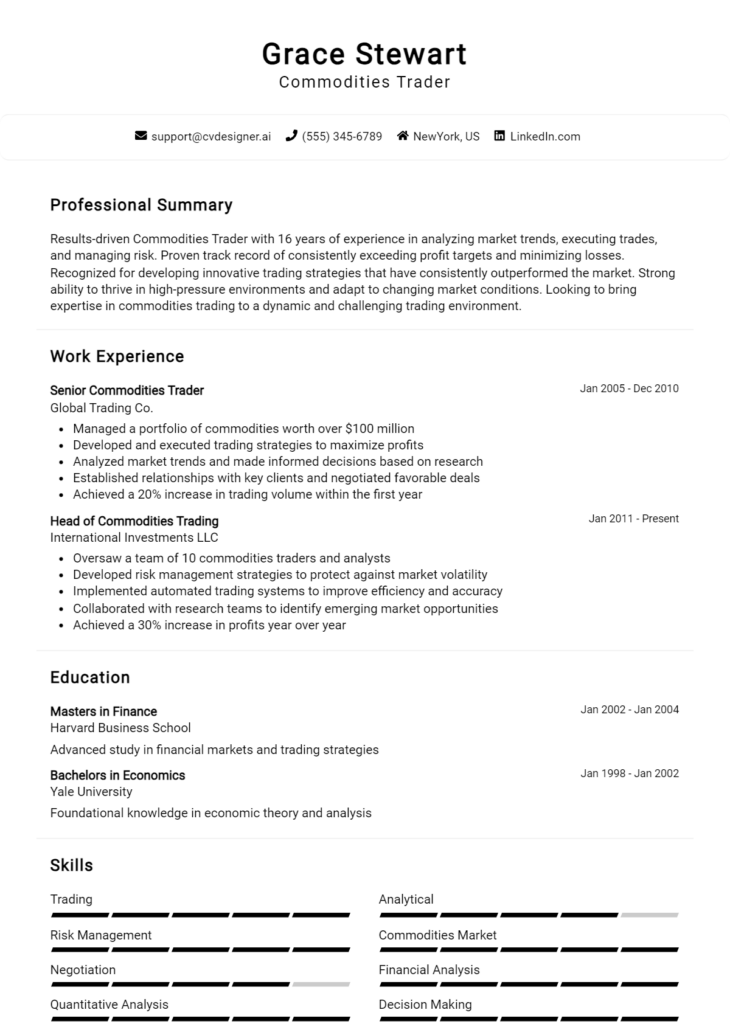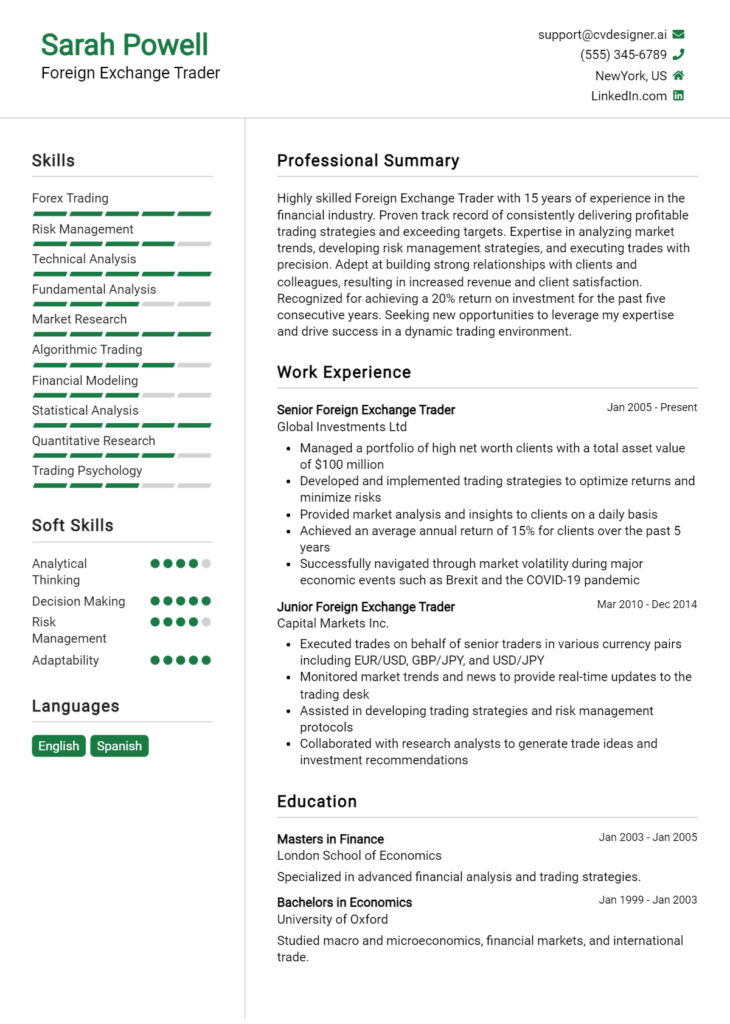Derivatives Trader Core Responsibilities
A Derivatives Trader is responsible for the buying and selling of financial contracts, such as options and futures, to manage risk and optimize returns. This role requires a strong understanding of market dynamics, technical analysis, and trading strategies, necessitating exceptional analytical and problem-solving skills. Derivatives Traders often collaborate with risk management, compliance, and research departments, ensuring that their trading decisions align with the organization's overall financial goals. A well-structured resume highlighting these competencies is essential for showcasing one’s qualifications effectively.
Common Responsibilities Listed on Derivatives Trader Resume
- Execute trades on behalf of clients and the firm based on market analysis.
- Monitor market trends and economic indicators to inform trading strategies.
- Develop and implement risk management protocols to safeguard investments.
- Analyze and interpret complex financial data to identify trading opportunities.
- Collaborate with research teams to gather insights on market movements.
- Maintain compliance with regulatory requirements and internal policies.
- Communicate trading strategies and performance metrics to stakeholders.
- Utilize quantitative models to enhance trading decision-making processes.
- Prepare detailed reports on trading activity and portfolio performance.
- Engage in continuous education on market developments and derivatives products.
- Manage client relationships and provide tailored trading solutions.
- Optimize trading systems and platforms for efficiency and accuracy.
High-Level Resume Tips for Derivatives Trader Professionals
In the highly competitive field of derivatives trading, a well-crafted resume is crucial for standing out among a pool of talented candidates. Your resume is often the first impression you make on potential employers, and it serves as a vital tool to showcase your skills, achievements, and experience in the industry. A compelling resume not only highlights your technical proficiency but also reflects your understanding of market dynamics and trading strategies. This guide will provide practical and actionable resume tips specifically tailored for Derivatives Trader professionals, ensuring you present your qualifications in the best possible light.
Top Resume Tips for Derivatives Trader Professionals
- Tailor your resume to align with the specific job description, emphasizing relevant skills and experiences that match the employer's needs.
- Highlight your trading experience, including the types of derivatives you've worked with and the markets you are familiar with.
- Quantify your achievements by including metrics such as profit margins, risk management success, or portfolio growth to demonstrate your impact.
- Showcase industry-specific skills, such as knowledge of financial instruments, market analysis, and risk assessment techniques.
- Incorporate keywords from the job listing to pass through Applicant Tracking Systems (ATS) and catch the attention of hiring managers.
- Include relevant certifications or licenses (e.g., CFA, Series 7) that enhance your credibility in the derivatives trading space.
- Use a clean and professional format that allows for easy readability, ensuring that key information stands out.
- Emphasize your ability to work under pressure and make quick decisions, as these are crucial traits for success in trading environments.
- Consider adding a summary statement at the top of your resume that encapsulates your experience and career ambitions in derivatives trading.
By implementing these tips, you can significantly increase your chances of landing a job in the Derivatives Trader field. A well-structured and targeted resume not only helps you to effectively communicate your qualifications but also positions you as a strong candidate in the eyes of potential employers, setting the stage for a successful career in trading.
Why Resume Headlines & Titles are Important for Derivatives Trader
In the competitive landscape of finance, particularly in derivatives trading, a well-crafted resume headline or title plays a crucial role in capturing the attention of hiring managers. A strong headline can serve as the first impression, summarizing a candidate's key qualifications in one impactful phrase. It should be concise, relevant, and directly related to the job being applied for, thereby allowing the candidate to stand out in a crowded field. By effectively conveying expertise and focus, a powerful resume headline can set the tone for the entire resume, increasing the likelihood of securing an interview.
Best Practices for Crafting Resume Headlines for Derivatives Trader
- Keep it concise: Aim for one to two impactful phrases that summarize your qualifications.
- Make it role-specific: Tailor your headline to reflect the specific position you are applying for.
- Highlight key skills: Incorporate relevant skills that showcase your expertise in derivatives trading.
- Use action-oriented language: Choose dynamic verbs to convey your proactive approach to trading.
- Quantify achievements: Whenever possible, include metrics to illustrate your accomplishments.
- Avoid jargon: Use clear language that can be easily understood by hiring managers outside your field.
- Stay professional: Maintain a formal tone while showcasing your personality and passion for trading.
- Test different versions: Experiment with various headlines to see which one resonates best with your target audience.
Example Resume Headlines for Derivatives Trader
Strong Resume Headlines
"Results-Driven Derivatives Trader with 7 Years of Experience in Risk Management and Profit Maximization"
“Innovative Derivatives Trader Specializing in Options Strategies and Market Analysis”
“Dynamic Trader with Proven Track Record in Leveraging Derivatives for Portfolio Growth”
Weak Resume Headlines
“Trader Looking for Opportunities”
“Experienced Professional in Finance”
Strong headlines are effective because they immediately convey the candidate’s unique strengths and relevance to the position, making it easier for hiring managers to identify potential fits for their teams. They are specific, focused on measurable achievements, and reflective of the candidate’s expertise. In contrast, weak headlines fail to impress because they lack detail and specificity, leaving hiring managers with little insight into the candidate's qualifications or what they bring to the table. A vague or generic title can blend into the sea of applications, diminishing the chances of securing a coveted interview.
Writing an Exceptional Derivatives Trader Resume Summary
A well-crafted resume summary is crucial for a Derivatives Trader as it serves as the first impression a hiring manager has of the candidate. This brief yet powerful introduction encapsulates key skills, relevant experience, and notable accomplishments that align with the demands of the role. A compelling summary not only captures attention but also sets the tone for the rest of the resume, making it essential for candidates to articulate their strengths clearly and concisely. Tailoring the summary to the specific job application ensures that it resonates with hiring managers, significantly increasing the chances of securing an interview.
Best Practices for Writing a Derivatives Trader Resume Summary
- Quantify Achievements: Use numbers to demonstrate your impact, such as percentage increases in profitability or reductions in risk.
- Focus on Key Skills: Highlight crucial skills relevant to derivatives trading, such as risk assessment, market analysis, and trading strategies.
- Tailor the Summary: Customize your summary for each job application by incorporating specific keywords from the job description.
- Be Concise: Keep your summary brief—ideally 2-4 sentences—while ensuring it remains impactful.
- Showcase Relevant Experience: Emphasize experiences that directly relate to derivatives trading, including previous roles, responsibilities, and outcomes.
- Use Action-Oriented Language: Begin sentences with action verbs to convey confidence and proactivity.
- Highlight Technical Proficiency: Mention familiarity with trading platforms, software, and analytical tools that are relevant to the position.
- Include Professional Designations: If applicable, reference any certifications or designations that enhance your qualifications, such as CFA or FRM.
Example Derivatives Trader Resume Summaries
Strong Resume Summaries
Dynamic Derivatives Trader with over 6 years of experience in optimizing trading strategies, resulting in a 25% increase in annual revenue. Proficient in using advanced analytics tools and algorithmic trading systems to capitalize on market inefficiencies. Strong background in risk management and regulatory compliance.
Results-driven Derivatives Trader with a proven track record of executing high-volume trades while maintaining an average return on investment (ROI) of 15%. Expertise in financial modeling and quantitative analysis, with a focus on options and futures markets.
Strategic Derivatives Trader specializing in equity derivatives, with successful management of a $50 million portfolio. Recognized for developing innovative hedging strategies that reduced exposure by 30%, while consistently outperforming benchmark indices.
Weak Resume Summaries
Experienced trader looking for a position in derivatives. Knowledgeable about trading and financial markets.
Motivated professional seeking to leverage skills in trading. Interested in derivatives trading and willing to learn.
The strong resume summaries stand out due to their clarity, specificity, and quantitative results, effectively showcasing the candidates' relevant skills and accomplishments in a direct manner. In contrast, the weak summaries lack detail and measurable outcomes, making them appear generic and less compelling. Providing concrete examples and aligning with the job requirements significantly enhances the effectiveness of a resume summary.
Work Experience Section for Derivatives Trader Resume
The work experience section of a Derivatives Trader resume plays a crucial role in demonstrating a candidate's technical skills, leadership abilities, and commitment to delivering high-quality financial products. This section not only allows candidates to showcase their relevant professional background but also highlights their capacity to manage teams effectively and drive results that are aligned with industry standards. By quantifying achievements, such as increased profitability or successful project completions, candidates can illustrate their impact within their previous roles, making it essential to present this information clearly and compellingly.
Best Practices for Derivatives Trader Work Experience
- Highlight specific technical skills relevant to derivatives trading, such as risk assessment, pricing models, and market analysis.
- Quantify your achievements with metrics, such as percentage increases in profitability or volume of trades executed.
- Include examples of successful collaboration with teams, emphasizing your role in leadership or mentorship.
- Align your experience with industry standards by using relevant terminology and frameworks recognized in the derivatives market.
- Demonstrate your ability to adapt to market changes and how you implemented strategies to overcome challenges.
- Provide context for your achievements, detailing the challenges faced and the solutions you implemented.
- Use action verbs to convey your contributions effectively and make your experiences more dynamic.
- Tailor your work experience to the job description, ensuring that it resonates with the employer's needs and expectations.
Example Work Experiences for Derivatives Trader
Strong Experiences
- Led a team of traders in developing a new derivatives pricing model that resulted in a 20% increase in trading profits over 12 months.
- Executed a high-volume trading strategy that generated $5 million in revenue within the first quarter, significantly exceeding performance targets.
- Collaborated with risk management teams to implement a comprehensive risk assessment framework, reducing potential losses by 15%.
- Managed a cross-functional project to enhance trading algorithms, leading to a 30% improvement in execution speed and accuracy.
Weak Experiences
- Responsible for trading activities and various transactions.
- Participated in team meetings to discuss trading strategies.
- Worked on projects related to derivatives but did not specify outcomes or contributions.
- Assisted in the trading process and followed market trends.
The examples categorized as strong illustrate clear, quantifiable outcomes that demonstrate the candidate's impact and effectiveness in their role. They provide specific metrics and detail collaborative efforts, showcasing leadership and technical expertise. In contrast, the weak experiences lack specificity and measurable achievements, making them less compelling and failing to convey the candidate's true capabilities or contributions in the derivatives trading field.
Education and Certifications Section for Derivatives Trader Resume
The education and certifications section of a Derivatives Trader resume is crucial in showcasing the candidate's academic background, industry-relevant certifications, and commitment to continuous learning. This section serves to demonstrate not only the foundational knowledge acquired through formal education but also any specialized training and certifications that validate the individual's expertise in derivatives trading. Providing relevant coursework and certifications can significantly enhance the candidate's credibility, aligning their qualifications with the specific demands of the role and making them a more attractive prospect for employers.
Best Practices for Derivatives Trader Education and Certifications
- Include degrees from reputable institutions, particularly in finance, economics, or mathematics.
- List industry-recognized certifications, such as Chartered Financial Analyst (CFA) or Financial Risk Manager (FRM).
- Highlight relevant coursework that pertains to derivatives, risk management, or financial modeling.
- Provide clear dates of completion for certifications to reflect currency in knowledge.
- Consider including ongoing education or training programs to showcase commitment to professional development.
- Use bullet points for clarity and to make the information easily scannable for recruiters.
- Prioritize certifications and courses that directly relate to derivatives trading and market analysis.
- Avoid listing irrelevant degrees or certifications that do not enhance your qualifications for the role.
Example Education and Certifications for Derivatives Trader
Strong Examples
- Bachelor of Science in Finance, University of Chicago, 2018
- Chartered Financial Analyst (CFA) Level II Candidate
- Financial Risk Manager (FRM), Global Association of Risk Professionals, 2021
- Advanced Derivatives Trading Course, New York Institute of Finance, 2020
Weak Examples
- Bachelor of Arts in English Literature, State University, 2015
- Basic Microsoft Office Certification, 2019
- Certificate in Project Management, 2020
- High School Diploma, 2010
The strong examples are considered relevant because they directly align with the skills and knowledge required for a Derivatives Trader, showcasing an appropriate academic background and recognized industry certifications. In contrast, the weak examples are deemed irrelevant as they do not pertain to the finance or trading domain, lacking the specialized focus needed to support a career in derivatives trading. Highlighting strong educational credentials and certifications can significantly enhance a candidate's appeal in a competitive job market.
Top Skills & Keywords for Derivatives Trader Resume
In the competitive world of finance, a well-crafted resume is essential for a Derivatives Trader. Highlighting the right skills can set you apart from other candidates and demonstrate your ability to manage complex financial instruments effectively. A strong focus on both soft and hard skills will provide potential employers with a clear picture of your qualifications and readiness for the role. Soft skills reflect your interpersonal abilities and emotional intelligence, while hard skills showcase your technical expertise and knowledge of financial markets. Ensuring that your resume captures these essential skills is vital for securing a position in this fast-paced field.
Top Hard & Soft Skills for Derivatives Trader
Soft Skills
- Analytical Thinking
- Problem Solving
- Communication Skills
- Team Collaboration
- Adaptability
- Decision Making
- Time Management
- Attention to Detail
- Emotional Intelligence
- Risk Management
Hard Skills
- Knowledge of Derivative Products (Options, Futures, Swaps)
- Proficiency in Financial Modeling
- Understanding of Market Dynamics
- Risk Assessment Techniques
- Trading Platforms (e.g., Bloomberg, MetaTrader)
- Quantitative Analysis
- Regulatory Compliance
- Statistical Analysis and Forecasting
- Portfolio Management
- Programming Skills (e.g., Python, R)
For more insights on how to effectively present your skills and work experience, consider tailoring your resume to highlight these key competencies that are essential for a successful career as a Derivatives Trader.
Stand Out with a Winning Derivatives Trader Cover Letter
I am writing to express my interest in the Derivatives Trader position at [Company Name], as advertised on [Where You Found the Job Posting]. With a robust background in financial analysis, risk management, and a solid understanding of derivative instruments, I am confident in my ability to contribute effectively to your team and help drive profitable trading strategies.
In my previous role at [Previous Company Name], I successfully managed a diverse portfolio of derivatives, utilizing my analytical skills to assess market trends and execute trades that consistently exceeded performance benchmarks. My experience with options, futures, and swaps has equipped me with the knowledge to identify profitable trading opportunities while maintaining a disciplined approach to risk management. I have also developed proprietary trading models that enhanced market analysis and improved decision-making processes, resulting in a significant increase in return on investment.
Collaboration and communication are key components of my trading philosophy. I thrive in fast-paced environments and work closely with cross-functional teams to ensure that our trading strategies align with broader organizational goals. I am adept at leveraging technology and data analytics to inform trading decisions and have a proven track record of adapting to rapidly changing market conditions while maintaining a strategic focus. I am excited about the opportunity to bring my expertise in derivatives trading to [Company Name] and contribute to its continued success.
Thank you for considering my application. I look forward to the opportunity to discuss how my skills and experiences align with the needs of your trading team. I am eager to bring my passion for finance and commitment to excellence to [Company Name] and help achieve exceptional results in the derivatives market.
Common Mistakes to Avoid in a Derivatives Trader Resume
When crafting a resume for a derivatives trader position, it’s essential to convey your expertise and experience effectively. However, many candidates make common mistakes that can undermine their chances of landing an interview. A well-structured resume not only highlights your skills but also reflects your professionalism and attention to detail. Below are some prevalent pitfalls to avoid when creating your derivatives trader resume:
Vague Job Descriptions: Using general terms and failing to provide specific examples of your achievements can make your resume blend in. Clearly outline your responsibilities and accomplishments in previous roles.
Neglecting Quantifiable Results: Failing to include measurable outcomes of your trading strategies can weaken your resume. Use numbers and percentages to showcase your success in risk management, profit generation, or portfolio growth.
Omitting Relevant Skills: Not highlighting key skills, such as knowledge of market analysis tools, trading platforms, or financial modeling, can leave gaps in your qualifications. Tailor your skillset to match the job description and industry requirements.
Inconsistent Formatting: A cluttered or inconsistent format can make your resume hard to read. Use clear headings, bullet points, and a professional font to present your information neatly.
Overemphasizing Education: While education is important, especially in finance, overemphasizing it at the expense of professional experience can be a mistake. Focus more on your work history and accomplishments in trading roles.
Ignoring Industry Keywords: Many companies use applicant tracking systems (ATS) to screen resumes. Not incorporating relevant industry keywords can lead to your resume being overlooked. Research common terms in job postings and integrate them into your document.
Including Irrelevant Information: Adding unrelated work experience or personal interests can dilute the focus of your resume. Keep your content concise and relevant to the derivatives trading position.
Typos and Grammatical Errors: Simple mistakes can reflect poorly on your attention to detail. Always proofread your resume multiple times and consider having someone else review it for errors before submission.
Conclusion
As a Derivatives Trader, your role is crucial in managing risk and maximizing profits through the trading of financial instruments like options and futures. This article has explored several key aspects of the position, including the importance of analytical skills, market knowledge, and the ability to make quick decisions under pressure. We highlighted the significance of staying updated with market trends and the necessity of a robust trading strategy. Furthermore, networking and continuous learning were emphasized as critical components for success in this competitive field.
In conclusion, as you pursue your career as a Derivatives Trader, it's essential to present yourself effectively through a polished resume. We encourage you to take a moment to review and refine your Derivatives Trader Resume. Utilize the resources available, such as resume templates, resume builder, resume examples, and cover letter templates. These tools can help you create a standout application that reflects your skills and expertise, ensuring you make a strong impression in the job market. Don't wait—take the next step in your career today!

